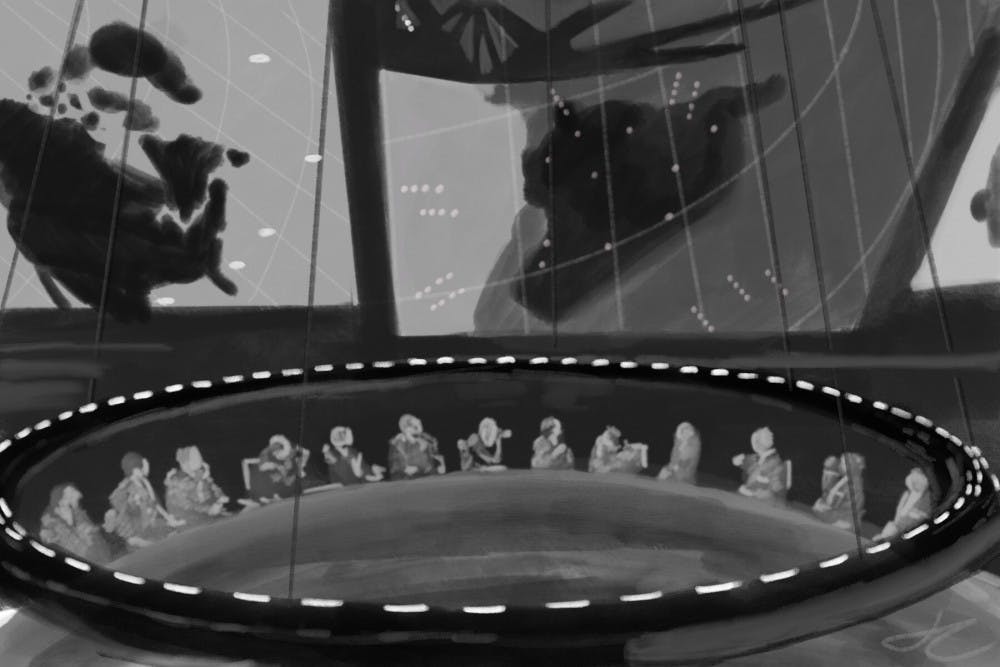The creation and use of chemical weapons are an undeniable scourge on humanity, from their use by Germany in the European battlefields of World War I, to the chemical attack in Khan Sheikhoun in Syria on April 4 that is believed to have killed more than 80 people.
But a military solution is not the only solution to this problem.
Here at ASU, we are part of the millennial generation which will end up as the foreign policy Wise Men (and women) of the future. We will determine whether to pull the trigger or not on military actions.
I pray that the generation of the future will be less reluctant to indulge in conflict than those in power today, Democrats and Republicans alike.
While the The Organization for the Prohibition of Chemical Weapons says it is currently investigating the attack against civilians in Khan Sheikhoun, the U.S. government has said it has no doubt the Syrian government was responsible, although Assad himself denies responsibility for the attack, calling it a “100 percent fabrication.”
Other than being a blatant violation of international law banning the use of chemical weapons, it is another violent episode in a war that is now believed to have killed nearly half a million people.
But just because the attack was horrendous, does not mean an escalating war between Syria and the U.S. will make things any better, and the missile strike April 7 on Shayrat Airbase by the American military could very well be the start of that.
The action may have not even been legal, let alone ethical.
While there have been many grumblings about the legality of the lack of Congressional approval the president had in the strike, I find it more troubling that the action was not authorized by the United Nations Charter, which only allows the use of force with approval by the Council or in self-defense.
This is not the first time that the Charter was disregarded by the U.S. Government; As reported by The Guardian, former U.N. secretary general Kofi Annan said the 2003 U.S.-led invasion of Iraq was not sanctioned by the council, describing it as “illegal.”
The U.N. Security Council surely has its flaws, but it is also an important safeguard to unilateral military actions like this one. The idea of the council is one of consensus, that you should not resort to military action unless five of the world’s largest powers can reach a consensus on it.
Other than being illegal by international law, I fail to understand what gains are made for the Syrian people in this airstrike.
Reportedly, the Trump Administration’s greater policy is to neutralize ISIS, broker cease-fires between government and rebel forces and eventually look to oust Syrian President Bashar al-Assad.
Where does this air strike fit into this equation? If you are saying to weaken the government of Bashar al-Assad, it does not seem to have worked. Although badly damaging the base, Syrian warplanes were reportedly taking off from the base just days later.
Tanzil Chowdhury is the co-chair of the ASU Chapter of Students for a Democratic Society, which he describes as an officially non-partisan organization dedicated to "increasing student power" in university life, although he did say members of the ASU chapter tend to be left-leaning.
Chowdhury said the ASU chapter opposes the strikes, emphasizing that they oppose "the taking of unilateral action" against another government, especially without the approval of Congress.
"We do not support Assad's actions in any way, but we believe the unilateral military action to attempt to solve this issue is misguided," Chowdhury said.
I don’t claim to have all of the answers about the Syrian Civil War; it is a conflict so complicated that it’s Wikipedia article has four different columns.
But this air strike is not going to make it any better. If anything, it could turn Assad into an even greater pariah actor who, now facing down the United States militarily, will stop at nothing to stay in power.
Military actions can have value; I’m glad the Allied powers fought the Nazis and that the Union fought the racist slave-holding Confederacy.
But the conflicts in Vietnam, Afghanistan, Iraq, Libya, along with other military strikes across the world in the War on Terror, have largely been ineffective in their results; many of these nations are now failed states grasping at the straws of stability.
We are millennials. We are better than this. We are better than chemical weapons, but also better than unilateral aggressive military actions.
Reach the columnist at Marinodavidjr@gmail.com or follow @Marinodavidjr on Twitter.
Editor’s note: The opinions presented in this column are the author’s and do not imply any endorsement from The State Press or its editors.
Want to join the conversation? Send an email to opiniondesk.statepress@gmail.com. Keep letters under 500 words and be sure to include your university affiliation. Anonymity will not be granted.
Like The State Press on Facebook and follow @statepress on Twitter




